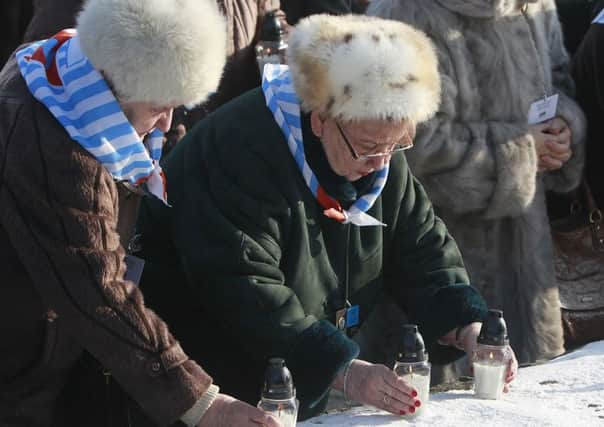Holocaust memorial day marked at events around the world


More than two million people travelled to Poland to visit the site of the former Nazi death camp in 2016 – a record number in the history of the memorial, which will mark the 70th anniversary of its opening this year.
Museum spokesman Pawel Sawicki has warned of the “new problem” facing young people who “aren’t taught to select information” from a glut of online sources, and so risk being poisoned by seemingly legitimate claims of Holocaust deniers.
Advertisement
Hide AdAdvertisement
Hide AdBut, he said: “I think for a person who has visited the Auschwitz memorial, it makes him a denial-proof person.
“After seeing this, after facing the authentic side, it’s much more difficult for anyone to reach this young person who comes and visits and and says ‘The Holocaust didn’t happen, the Holocaust is a hoax, no gas chambers existed’.
“And they have this personal experience that will protect them.”
Mr Sawicki said that in a world where “information is everywhere”, the museum was recognising that online education was increasingly important and that it must pay equal attention to those who visit the memorial and those who cannot.
Part of this education, he said, involves calling out anti-semitism, inaccuracies and insensitivity publicly on websites such as Twitter so that other users can see the exchanges and reach their own conclusions.
The Auschwitz museum Twitter account has even previously drawn attention to ethical qualms of vendors marketing Auschwitz-themed merchandise including shower curtains and cushion covers. More than one million men, women and children died at the camp which was liberated by the Soviet Red Army 72 years ago today – 27 January, 1945.
On Thursday night Scotland’s national commemoration event took place at Bishopbriggs Academy in East Dunbartonshire.
International speakers included author Saskia Tepe, the daughter of a Holocaust survivor, and Umutesi Stewart, survivor of the Rwandan Genocide.
Advertisement
Hide AdAdvertisement
Hide AdGuests – who included Deputy First Minister John Swinney – also heard from Bishopbriggs Academy pupils who had visited Auschwitz.
Yesterday, dozens of Auschwitz survivors placed wreaths and flowers at the execution wall of the former camp.